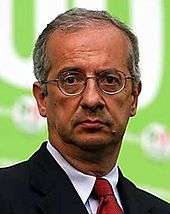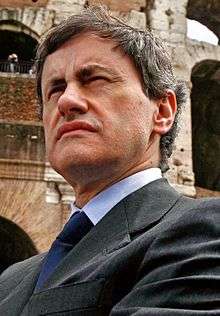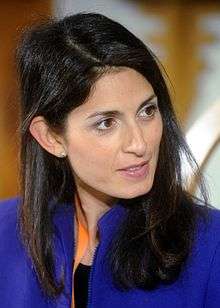Mayor of Rome
The Mayor of Rome (Italian: Sindaco di Roma Capitale) is an elected politician who, along with Rome’s City Council (Italian: Assemblea Capitolina) of 48 members, is accountable for the strategic government of Rome. As Rome is a comune speciale since 2009, the office is different from the offices of the other Italian cities. The title is the equivalent of Lord Mayor in the meaning of an actual executive leader.
| Mayor of Rome
Sindaco di Roma Capitale | |
|---|---|
 | |
| Style | No title or style |
| Residence | Palazzo Senatorio |
| Appointer | Electorate of Rome |
| Term length | 5 years, renewable once |
| Inaugural holder | Francesco Rospigliosi Pallavicini |
| Formation | 23 September 1870 |
| Deputy | Luca Bergamo |
| Salary | €4,500 per month |
| Website | Official website |
Overview

According to the City of Rome Statutes, the Mayor of Rome is a member of Rome's City Council (Italian: Assemblea Capitolina). The Mayor is elected by the population of Rome. Citizens elect also the members of the City Council, which also controls the Mayor's policy guidelines and is able to enforce his or her resignation by a motion of no confidence. The Mayor is entitled to appoint and release the members of their government, which are twelve (Italian: Assessori delle Giunta Capitolina) according to the Italian Constitution.
The seat of the City Council is the city hall Palazzo Senatorio on the Capitoline Hill.
History
As capital of the Papal States, Rome did not receive its Mayor until 1870, when it became the capital of Kingdom of Italy. The new Mayor served as member of the city council and he was appointed every three years by the King of Italy. Then since 1889 the Mayor was elected every four years by the City Council. However, the fascist dictatorship abolished mayors and City councils in 1926, replacing them with a single authoritarian Rector (Podestà) chosen by the National Fascist Party. The rector of Rome was called "Governatore" (Governor).
After World War II, the Mayor was chosen by the City Council and only in 1993 the Mayor was firstly elected by the population (originally every four, then every five years).
List of Mayors of Rome
Papal States (1558–1870)
From 1558 to 1870, the Papal States created the office of Governatore (Governor), also called Vice Camerlengo, chosen by the Pope.
- 1558–1560 – Virgilio Rosario
- 1560–1588 – Giacomo Savelli
- 1588–1603 – Girolamo Rusticucci
- 1603–1605 – Camillo Borghese (future Pope Paul V)
- 1605–1610 – Girolamo Pamphili
- 1610–1629 – Giovanni Garzia Millini
- 1629–1671 – Marzio Ginetti
- Acting 1671 – Paluzzo Paluzzi Altieri degli Albertoni
- 1671–1714 – Gaspare Carpegna
- 1714–1721 – Giovanni Domenico Paracciani
- 1721–1726 – Fabrizio Paolucci
- 1726–1732 – Prospero Marefoschi
- 1732–1759 – Giovanni Antonio Guadagni
- 1759–1762 – Antonio Maria Erba Odescalchi
- 1762–1793 – Marcantonio Colonna
- 1793–1795 – Andrea Corsini
- 1795–1810 – Giulio Maria della Somaglia
- 1810–1813 – Antonio Despuig y Dameto
- 1813–1820 – Lorenzo Litta
- 1820–1823 – Annibale Sermattei della Genga (future Pope Leo XII)
- Acting 1823–1824 – Giuseppe della Porta Rodiani
- 1824–1834 – Placido Zurla
- 1834–1838 – Carlo Odescalchi
- 1838–1841 – Giuseppe della Porta Rodiani
- 1841–1870 – Costantino Patrizi Naro
Kingdom of Italy (1870–1946)
From 1870, when Rome was annexed, the Kingdom of Italy created the office of the Mayor of Rome (Sindaco di Roma), chosen by the City council. In 1926, the Fascist dictatorship abolished mayors and City councils, replacing them with a single authoritarian Governatore (Governor) chosen by the National Fascist Party.
| Mayor | Term start | Term end | Party | ||||
|---|---|---|---|---|---|---|---|
| – | Michelangelo Caetani[1] | 23 September 1870 | 30 September 1870 | Independent | |||
| – | Giuseppe Lunati[2] | 29 November 1870 | 20 December 1870 | Independent | |||
| – | Filippo Doria Pamphili[2] | 21 December 1870 | March 1871 | Independent | |||
| – | Giovanni Angelini[2] | March 1871 | 16 April 1871 | Independent | |||
| 1 | Francesco Rospigliosi Pallavicini | 16 April 1871 | 21 October 1871 | Independent | |||
| 2 | Luigi Pianciani | 29 July 1873 | 5 August 1874 | Left | |||
| 3 | Pietro Venturi | 15 January 1875 | 7 November 1877 | Left | |||
| 4 | Emanuele Ruspoli | 18 July 1878 | 20 July 1880 | Right | |||
| (2) | Luigi Pianciani | October 1881 | May 1882 | Left | |||
| 5 | Leopoldo Torlonia | May 1882 | 31 December 1887 | Right | |||
| 6 | Alessandro Guiccioli | 24 October 1888 | 28 November 1889 | Left | |||
| 7 | Augusto Armellini | 28 November 1889 | 20 June 1890 | Left | |||
| 8 | Onorato Caetani | 29 December 1890 | 14 November 1892 | Right | |||
| (4) | Emanuele Ruspoli | 14 November 1892 | 29 November 1899 | Right | |||
| 9 | Prospero Colonna di Paliano | December 1899 | October 1904 | Right | |||
| 10 | Enrico Cruciani Alibrandi | 10 July 1905 | 10 July 1907 | Independent | |||
| 11 | Ernesto Nathan | 25 November 1907 | 8 December 1913 | Radical | |||
| (9) | Prospero Colonna di Paliano | 6 July 1914 | 8 June 1919 | Liberal | |||
| 12 | Adolfo Apolloni | 8 June 1919 | 25 November 1920 | Liberal | |||
| 13 | Luigi Rava | 25 November 1920 | 23 May 1921 | Liberal | |||
| 14 | Giannetto Valli | 23 May 1921 | 26 June 1922 | Liberal | |||
| 15 | Filippo Cremonesi | 26 June 1922 | 1 January 1926 | Independent | |||
| Fascist Governor (1926–1944) | |||||||
| 1 | Filippo Cremonesi | 1 January 1926 | 9 December 1926 | PNF | |||
| 2 | Ludovico Spada Veralli Potenziani | 9 December 1926 | 13 September 1928 | PNF | |||
| 3 | Francesco Boncompagni Ludovisi | 13 September 1928 | 23 January 1935 | PNF | |||
| 4 | Giuseppe Bottai | 23 January 1935 | 15 November 1936 | PNF | |||
| 5 | Piero Colonna | 15 November 1936 | 30 August 1939 | PNF | |||
| 6 | Giangiacomo Borghese | 30 August 1939 | 21 August 1943 | PNF | |||
| 7 | Giovanni Orgera | 6 January 1944 | 10 June 1944 | PFR | |||
| Allied occupation (1944–1946) | |||||||
| 16 | Filippo Andrea VI Doria Pamphili | 10 June 1944 | 10 December 1946 | Independent | |||
Republic of Italy (1946–present)
From 1946 to 1993, the Mayor of Rome was chosen by the City Council.
| Mayor | Term start | Term end | Party | Coalition | Election | |
|---|---|---|---|---|---|---|
| 17 | Salvatore Rebecchini | 10 December 1946 | 2 July 1956 | DC | DC (1946–47) DC • PLI • UQ (1947–52) DC • PLI • PRI (1952–56) |
1946 1947 1952 |
| 18 | Umberto Tupini | 2 July 1956 | 10 January 1958 | DC | Centrism (DC • PLI • PRI • PSDI) |
1956 |
| 19 | Urbano Cioccetti | 10 January 1958 | 11 July 1961 | DC | ||
| - | 1960 | |||||
| 20 | Glauco Della Porta | 17 July 1962 | 12 March 1964 | DC | Organic Centre-left (DC • PSI • PSDI • PRI) |
1962 |
| 21 | Amerigo Petrucci | 12 March 1964 | 29 December 1967 | DC | 1966 | |
| 22 | Rinaldo Santini | 29 December 1967 | 30 July 1969 | DC | ||
| 23 | Clelio Darida | 30 July 1969 | 9 August 1976 | DC | DC • PSI • PSDI (1969–71) DC (1971–76) |
1971 |
| 24 | Giulio Carlo Argan | 9 August 1976 | 29 September 1979 | SI | Red Junta (PCI • PSI • PSDI • PRI) |
1976 |
| 25 | Luigi Petroselli | 29 September 1979 | 7 October 1981[lower-alpha 2] | PCI | ||
| 26 | Ugo Vetere | 15 October 1981 | 30 July 1985 | PCI | 1981 | |
| 27 | Nicola Signorello | 30 July 1985 | 6 August 1988 | DC | Pentapartito (DC • PSI • PSDI • PRI • PLI) |
1985 |
| 28 | Pietro Giubilo | 6 August 1988 | 19 July 1989 | DC | ||
| - | ||||||
| 29 | Franco Carraro | 19 December 1989 | 19 April 1993 | PSI | Pentapartito (DC • PSI • PSDI • PRI • PLI) |
1989 |
| - | ||||||
- Notes
- Nominated by the Prefect after the City Council failed to elect a Mayor.
- Died in office.
- Nominated by the Prefect after the Mayor lost the support of the majority of the City Council.
- Nominated by the Prefect after the Mayor and the members of the City Council resigned in order to hold a new election under the provision of the new local electoral law.
Since 1993, under provisions of new local administration law, the Mayor of Rome is chosen by direct election, originally every four, and since 2001 every five years.
| Mayor of Rome | Took office | Left office | Party | Coalition | Election | ||||
|---|---|---|---|---|---|---|---|---|---|
| 30 |  |
Francesco Rutelli (b. 1954) |
6 December 1993 | 8 January 2001[3] | FdV | Alliance of Progressives 5 December 1993 – 17 November 1997 |
1993 | ||
| The Olive Tree 17 November 1997 – 8 January 2001 |
1997 | ||||||||
| Special Prefectural Commissioner tenure (8 January 2001 – 1 June 2001) | |||||||||
| 31 |  |
Walter Veltroni (b. 1955) |
1 June 2001 | 13 February 2008[4] | DS PD |
The Olive Tree 1 June 2001 – 1 June 2006 |
2001 | ||
| The Olive Tree 1 June 2006 – 13 February 2008 |
2006 | ||||||||
| Special Prefectural Commissioner tenure (13 February 2008 – 28 April 2008) | |||||||||
| 32 |  |
Gianni Alemanno (b. 1958) |
28 April 2008 | 12 June 2013 | PdL | PdL 28 April 2008 – 12 June 2013 |
2008 | ||
| 33 |  |
Ignazio Marino (b. 1955) |
12 June 2013 | 31 October 2015[5] | PD | PD • SEL 12 June 2013 – 31 October 2015 |
2013 | ||
| Special Prefectural Commissioner tenure (31 October 2015 – 22 June 2016) | |||||||||
| 34 |  |
Virginia Raggi (b. 1978) |
22 June 2016 | Incumbent | M5S | M5S since 22 June 2016 |
2016 | ||
Timeline
Mayors

Political coalition

By time in office
| Rank | Mayor | Political Party | Total time in office |
|---|---|---|---|
| 1 | Salvatore Rebecchini | DC | 9 years, 205 days |
| 2 | Francesco Rutelli | FdV | 7 years, 33 days |
| 3 | Clelio Darida | DC | 7 years, 10 days |
| 4 | Walter Veltroni | DS | 6 years, 257 days |
| 5 | Gianni Alemanno | PdL | 5 years, 45 days |
| 6 | Virginia Raggi | M5S | 4 years, 54 days |
| 7 | Amerigo Petrucci | DC | 3 years, 292 days |
| 8 | Ugo Vetere | PCI | 3 years, 288 days |
| 9 | Urbano Cioccetti | DC | 3 years, 182 days |
| 10 | Franco Carraro | PSI | 3 years, 121 days |
| 11 | Giulio Carlo Argan | SI | 3 years, 51 days |
| 12 | Nicola Signorello | DC | 3 years, 7 days |
| 13 | Ignazio Marino | PD | 2 years, 141 days |
| 14 | Luigi Petroselli | PCI | 2 years, 8 days |
| 15 | Glauco Della Porta | DC | 1 year, 239 days |
| 16 | Rinaldo Santini | DC | 1 year, 213 days |
| 17 | Umberto Tupini | DC | 1 year, 192 days |
| 18 | Pietro Giubilo | DC | 347 days |
Election
References
- President of the Government Council of Rome (Presidente della Giunta di Governo di Roma).
- Acting mayor.
- He left the office because he was candidate at the 2001 general election as Prime Minister.
- He left the office because he was candidate at the 2008 general election as Prime Minister.
- Ousted from office after more than half the city's councillors stepped down.